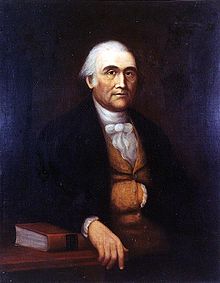Robert Smith (Cabinet member)
Robert Smith | |
|---|---|
 | |
| 6th United States Secretary of State | |
| In office March 6, 1809 – April 1, 1811 | |
| President | James Madison |
| Preceded by | James Madison |
| Succeeded by | James Monroe |
| United States Attorney General Acting | |
| In office March 2, 1805 – August 7, 1805 | |
| President | Thomas Jefferson |
| Preceded by | Levi Lincoln |
| Succeeded by | John Breckinridge |
| 2nd United States Secretary of the Navy | |
| In office July 27, 1801 – March 4, 1809 | |
| President | Thomas Jefferson |
| Preceded by | Benjamin Stoddert |
| Succeeded by | Paul Hamilton |
| Personal details | |
| Born | November 3, 1757 Lancaster, Pennsylvania |
| Died | November 26, 1842 (aged 85) Baltimore, Maryland, United States |
| Political party | Democratic-Republican Party |
| Spouse | Margaret Smith |
| Alma mater | Princeton University |
| Profession | Lawyer |
| Signature | |
| Military service | |
| Branch/service | Continental Army |
| Battles/wars | American Revolutionary War |
Robert Smith (November 3, 1757 – November 26, 1842) was the second United States Secretary of the Navy from 1801 to 1809 and the sixth United States Secretary of State from 1809 to 1811. He was the brother of Senator Samuel Smith.
Smith was born in Lancaster, Pennsylvania. During the American Revolutionary War, he served in the Continental Army and participated in the Battle of Brandywine. He graduated from Princeton in 1781 and began to practice law in Maryland. Smith became the Presidential Elector in the Electoral College for Maryland in 1789, then a member of state's senate from 1793 to 1795, and finally a member of Maryland's house of delegates from 1796 to 1800. President Thomas Jefferson appointed him as Secretary of the Navy in July, 1801 after William Jones declined the position. On March 2, 1805, the Senate confirmed the appointments of Smith as United States Attorney General and Jacob Crowninshield as Secretary of the Navy. However, Crowninshield declined his appointment, so Smith briefly served as both Attorney General and Secretary of the Navy. Eventually, President Jefferson appointed John Breckinridge to replace Smith as Attorney General and Smith resumed his role as a full-time Secretary of the Navy. Smith finally left the office of Secretary of the Navy with the end of President Jefferson's administration on March 4, 1809. Jefferson's successor, President James Madison, immediately appointed Smith as Secretary of State, an office which he held from March 6, 1809 until his forced resignation on April 1, 1811.
Smith was closely allied with his brother, Maryland Senator Samuel Smith. He bitterly opposed Treasury Secretary Albert Gallatin. Madison thought he could be his own Secretary of State, but Smith so often pursued opposite policies that Madison finally demanded his resignation. In Madison's April 1811 “Memorandum on Robert Smith” the president offered a laundry list of Smith's shortcomings: he questioned Smith's loyalty; he found Smith's diplomatic correspondence wanting; he had been indiscreet in conversations with the British; and he had opposed the Administration's efforts to secure concessions from Britain and France by limiting trade. Apparently Smith was bewildered by these and other charges leveled by Madison and published an exoneration of himself, "Robert Smith's Address to the People of the United States," an attack on Madison's foreign policy. Madison offered Smith the post of ambassador to Russia, currently then held by John Quincy Adams. Smith considered the offer, but in the end, he refused the post. [1]
Smith became the president of the not-yet-fully-organized American Bible Society in 1813. In 1818, he became the founding president of the Maryland Agriculture Society and afterwards retired to a more private life where he enjoyed his wealth. Robert Smith died in Baltimore, Maryland, on November 26, 1842. The USS Robert Smith (DD-324) was named for him.
References
- Clifford Egan, "Robert Smith" in Edward S. Mihalkanin, ed. American Statesmen: Secretaries of State from John Jay to Colin Powell Greenwood Press 2004. pp 478–83.
[1] Andrew Burstein & Nancy Isenberg, Madison and Jefferson (New York: Random House,2010),495
External links
- Robert Smith at Find A Grave
- Robert Smith at the Naval Historical Center
- Robert Smith at the United States Department of State
- Robert Smith at the Hall of the Secretaries of State
- 1757 births
- 1842 deaths
- American people of the War of 1812
- Burials at Westminster Hall and Burying Ground
- Continental Army soldiers
- Jefferson administration cabinet members
- Maryland State Senators
- Members of the Maryland House of Delegates
- People from Lancaster, Pennsylvania
- People of Maryland in the American Revolution
- Princeton University alumni
- United States Secretaries of State






